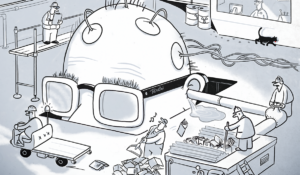We all have our own point of view on almost every situation or topic, this is how our brain works. Based on previous experiences or patterns it calculates possible outcomes regardless of knowing or being aware that the conclusion is right or wrong. It simply does it. Operating with questions is precisely the way to avoid learning, because we do not confront our own point of view with that of others, but hide it behind a wall of incessant questions. In my coaching sessions, for example, I often observe that a combination of questioning and sharing experience can achieve behavioural change.
It’s much wiser to combine expression with curiosity, so we can learn from each other. For example, with a little vulnerability, we can speak our minds and others are free to pick on us. Obviously, we don’t want to look stupid. We can avoid this by, for example, presenting our ideas in the following way. How does that sound to you?”
We don’t clash with anything, there is no debate, so there is nothing to win. We have nothing to gain by presenting only the data and facts that support our position or are in our favour. There is no reason to avoid points where our case may be weaker or less supported. With such an introduction we are looking for precisely where there is a flaw in our argument.
This culture may not be present in all companies, but with some preparation and patience, we can learn how to question others when we disagree with their statements. I’ve put together some ideas on how you can combine giving your opinion and asking questions:
When you present your own point of view:
- Be explicit in your reasoning: explain how you reached your conclusion and what data you took into account.
- Encourage others to understand your reasoning: do you see a flaw in the logic?
- Encourage others to throw in other perspectives: is there other data or information, other possible conclusions?
When you challenge the point of view of others:
I often hear the phrase “I’d like to challenge your idea”. I always get the feeling that I’m being prepared for “tough moments ahead.” It’s a bit like when the comedian announces before the joke that there’s a joke coming, but then no one laughs. There’s no need for this preloading, you can ask questions in a civilised way without it:
- How did you get to this point? What data and information did you take into account?
- Are there any data that do not support the point of view you have outlined?
- If you are making assumptions about the other person’s point of view, make it clear that you are only making assumptions.
- Tell us what data you are basing your assumptions on.
- Rather than asking questions, let’s be polite.
It is possible that the other person will not be open
- Try to understand the logic of how he was thinking.
- Ask him if there is any way to test his suggestion (maybe this will give us more or different information).
- If he is not open to alternatives, we can ask what might cause difficulties in implementing it.
- Or we can ask directly what it is about the situation, or about ourselves or others, that makes it difficult for him or her to have an open exchange of views.
The point is not to follow these points systematically. It is enough to try to keep them in mind when balancing between telling and asking. Since I don’t try to convince anyone of anything (not even my teenage sons) I can honestly say that my life has become much easier.
I used to joke that I have two faults: one is not paying attention and the other is not remembering.







